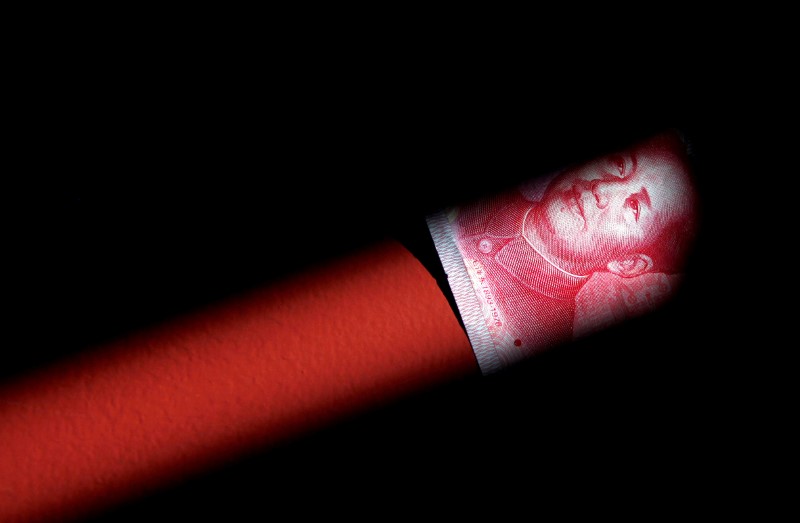By Winni Zhou and John Ruwitch
SHANGHAI (Reuters) - China's yuan traded in the offshore market is set for its biggest weekly gain on Friday, hovering around two-month highs after the authorities were suspected of pushing up overnight borrowing costs to discourage bearish bets on the currency.
Both onshore
Chinese authorities are keen to deter speculation in the currency and analysts and traders suspect policymakers have sought to prevent it from weakening to the 7-per-dollar level ahead of U.S. President-elect Donald Trump's inauguration on Jan. 20.
Traders said the market had long held a strong "one-way" expectation of depreciation in the yuan and the rally in the currency over the week was the authorities' attempt to alter such views.
But while policymakers may have some success in the short-run in arresting the yuan's descent, pressure will remain on the yuan to depreciate over time, they said.
"I don't think the volatility in the yuan so far this week will reverse the trend of depreciation. But the yuan is at least unlikely to have another rapid fall ahead of the Lunar New Year," said a Shanghai-based trader at a foreign bank, referring to the week-long holiday starting at the end of January.
The People's Bank of China (PBOC) set the official midpoint
That made it the largest upward move since the yuan was revalued and taken off a fixed dollar peg in July 2005.
By 0706 GMT, onshore spot yuan was trading at 6.9334 per dollar, down 0.7 percent from late Thursday. The Chinese currency, however, is around 0.2 percent higher than Friday's close and is on track to log its best week in more than a month.
Onshore yuan's retreat on Friday was a result of increasing dollar demand by companies after the U.S. currency eased off 14-year highs, said a trader at a Chinese bank.
BATTLING YUAN BEARS
Interbank rates for the offshore yuan
Overnight yuan interbank rates in Hong Kong were fixed at 61.333 percent on Friday, up sharply from 38.335 percent on Thursday, while yuan deposit rates implied by the offshore forward market
Some of the pressure on yuan funding has also been on account of a drying up of yuan deposits in Hong Kong as investors steadily lost faith in a currency which fell 6.6 percent in 2016, its biggest annual fall since 1994.
China's currency reserves data due this week is also expected to show reserves are close to falling below the critical $3 trillion figure, which would partly explain the authorities' desire to stem capital outflows and bets that the currency will keep depreciating.
The offshore yuan, or CNH, has risen about 2.5 percent since Tuesday, with its gains over Wednesday and Thursday being the biggest two-day gains since its introduction in 2010.
Its rally rippled across major currency markets, causing the U.S. dollar to give up some of its recent gains against the euro and yen.
Still, few seem to be altering their expectations for a weaker yuan in the coming months.
"We believe the surge in the CNH is not sustainable," Gao Qi, FX strategist at Scotiabank in Singapore, wrote in a note.
Gao expects the yuan to depreciate about 5 percent against the dollar this year amid market worries over potential political and trade conflicts between the United States and China after Trump takes office.
China's central bank will not tolerate sustained depreciation of the yuan, the China Securities Journal said on Friday.
The Chinese currency was not obviously over-valued, and the appreciation of the U.S. dollar has its upper limit, it said in a commentary.
